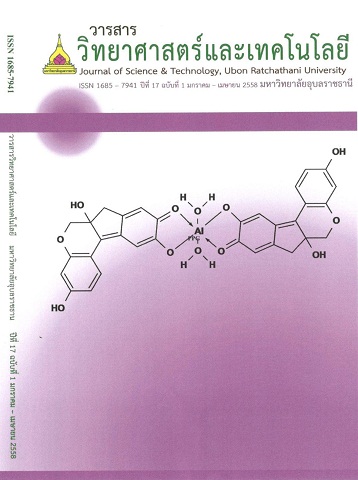การจัดการอนามัยสิ่งแวดล้อมในพื้นที่โรงเรียนตำรวจตระเวนชายแดน กองกำกับการตำรวจตระเวนชายแดนที่ 22 อุบลราชธานี
Main Article Content
บทคัดย่อ
การวิจัยเชิงสำรวจการจัดการด้านอนามัยสิ่งแวดล้อม ในโรงเรียนตำรวจตระเวนชายแดน กองกำกับการตำรวจตระเวนชายแดนที่ 22 อุบลราชธานี โดยทำการศึกษาในกลุ่มตัวอย่างที่สมัครใจในโรงเรียนจำนวน 5 โรงเรียนจาก 9 โรงเรียน เครื่องมือที่ใช้เป็น แบบสำรวจ และการตรวจทางห้องปฏิบัติการ วิเคราะห์ข้อมูลโดยใช้สถิติเชิงพรรณนา จำนวนและร้อยละ ผลการศึกษาพบว่า ด้านการจัดการขยะ ข้อที่การประเมินไม่ผ่านทุกโรงเรียน คือ ถังขยะมีสภาพชำรุด ไม่สะอาด ไม่มีฝาปิดมิดชิด ไม่มีการแยกถังขยะตามประเภทขยะและไม่มีป้ายระบุที่ชัดเจน ไม่มีการแยกขยะอันตรายและที่เก็บเป็นสัดส่วน ไม่มีการจัดตั้งโครงการธนาคารขยะในโรงเรียน ไม่มีบ่อฝังกลบขยะหรือเตาเผาขยะที่เหมาะสม รองลงมาคือ ไม่ผ่านร้อยละ 80.00 คือวิธีการกำจัดขยะโดยวิธีการเผาก่อให้เกิดผลกระทบต่อชุมชนรอบข้าง ด้านน้ำดื่มน้ำใช้ พบว่ามี 4 โรงเรียนผ่านเกณฑ์มาตรฐาน ด้านการสุขาภิบาลอาหารทางกายภาพ ข้อที่ไม่ผ่านมาตรฐานทุกโรงเรียนมากที่สุด ได้แก่ ไม่วางช้อน ส้อม ตะเกียบ โดยวางตั้งเอาด้ามขึ้นในภาชนะโปร่งสะอาด หรือวางเป็นระเบียบในภาชนะที่สะอาด และมีการปกปิดตั้งสูงจากพื้นอย่างน้อย 60 ซม. และเขียงต้องมีสภาพดีไม่แตกร้าว ไม่มีการแยกใช้เขียงเฉพาะอาหารสุกและอาหารดิบแยกจากกัน และมีฝาชีครอบ ส่วนผลการประเมินด้านชีวภาพโดยตรวจหาเชื้อโคลิฟอร์มแบคทีเรียจำนวน 51 ตัวอย่าง พบการปนเปื้อน 45 ตัวอย่าง คิดเป็นร้อยละ 84.24 โดยพบในอาหารและภาชนะเท่ากันคิดเป็นร้อยละ 33.33 และมือผู้สัมผัสอาหาร ร้อยละ 21.00 ด้านห้องส้วมพบว่าทุกโรงเรียนไม่มีสบู่ใช้ล้างมือในห้องส้วม ด้านสนามและบริเวณโดยรอบโรงเรียน พบว่า บริเวณโดยรอบสะอาดและปลอดภัย ร้อยละ 80.00 ดังนั้นโรงเรียนควรมีการจัดทำกิจกรรมการคัดแยกขยะในโรงเรียน และจัดทำเป็นธนาคารขยะในโรงเรียน และการกำจัดขยะควรมีการนำเตาเผาขยะอย่างง่ายที่สามารถบำบัดมลพิษทางอากาศขั้นต้นได้ ส่วนน้ำดื่มควรมีการปรับปรุงคุณภาพด้วยการฆ่าเชื้อโรคก่อนมาดื่ม เช่น การใช้เครื่องกรองน้ำ และโรงอาหารควรมี หรือจัดหาโต๊ะสำหรับวางอาหารและเตรียมปรุง และผู้ประกอบและสัมผัสอาหารควรมีการล้างมือด้วยสบู่ทุกครั้งก่อนและหลังประกอบอาหาร และควรมีการเตรียมสบู่สำหรับล้างมือในห้องน้ำ ห้องส้วมทุกห้อง
Environmental Health Management in Border Patrol Police Schools, Border Patrol Police Operation Division 22nd, Ubonratchathani Province.
This survey study is aimed to investigated indicies of good level of the environmental schools health practices in five of nine border patrol police schools which are agree to joint this research. Data were collected by checklists and laboratory tests and analyzed by the use of descriptive statistics, including frequencies and percentages. The results of the investigations of environmental health showed that solid waste management was unsatisfactory. Bins were damaged and lacked lids and labeling, and there was no separation of solid waste. Hazardous waste was not allocated an appropriate storage place and there was no recycle bank in the school area. Disposal of solid waste by incineration caused air pollution problems for 80% of the schools and the surrounding communities. The study found that 4 schools did not satisfy acceptable standard of drinking water. Results showed that sanitation in regards to food did not satisfy acceptable standards. Spoons, forks, and chopsticks were not kept in clean, airy, and covered containers at the required height of 60 centimeters above the floor. The one chopping block was cracked and did not have a cover, and there was no separate block for the cutting of raw and cooked food. The table and stove for food preparation and cooking was made from a material that was not easy to clean and not at the required height of 60 centimeters from the floor. The study found that the kitchen staff did not wear uniforms, aprons, hairnets, or caps. Tests for the coliform bacteria found 45 (84.24%) of 51 samples of food, 33.33% of the food containers, and 21.00% of the hands of the staff were contaminated. There was no soap for hand-washing in the toilets. Most (80%) of the playground and general area around the school was clean and safe. The study recommended that the schools also needed to introduce segregation of waste and recycle banks, and dispose of waste by a method that did not cause air pollution. Other recommendations included the filtration of drinking water to reduce bacterial content, improvements to the cooking areas, hand-washing before and after cooking by food staff, and the introduction of soap in toilets.
Article Details
บทความที่ได้รับการตีพิมพ์เป็นลิขสิทธิ์ของ วารสารวิทยาศาสตร์และเทคโนโลยี มหาวิทยาลัยอุบลราชธานี
ข้อความที่ปรากฏในบทความแต่ละเรื่องในวารสารวิชาการเล่มนี้เป็นความคิดเห็นส่วนตัวของผู้เขียนแต่ละท่านไม่เกี่ยวข้องกับมหาวิทยาลัยอุบลราชธานี และคณาจารย์ท่านอื่นๆในมหาวิทยาลัยฯ แต่อย่างใด ความรับผิดชอบองค์ประกอบทั้งหมดของบทความแต่ละเรื่องเป็นของผู้เขียนแต่ละท่าน หากมีความผิดพลาดใดๆ ผู้เขียนแต่ละท่านจะรับผิดชอบบทความของตนเองแต่ผู้เดียว


